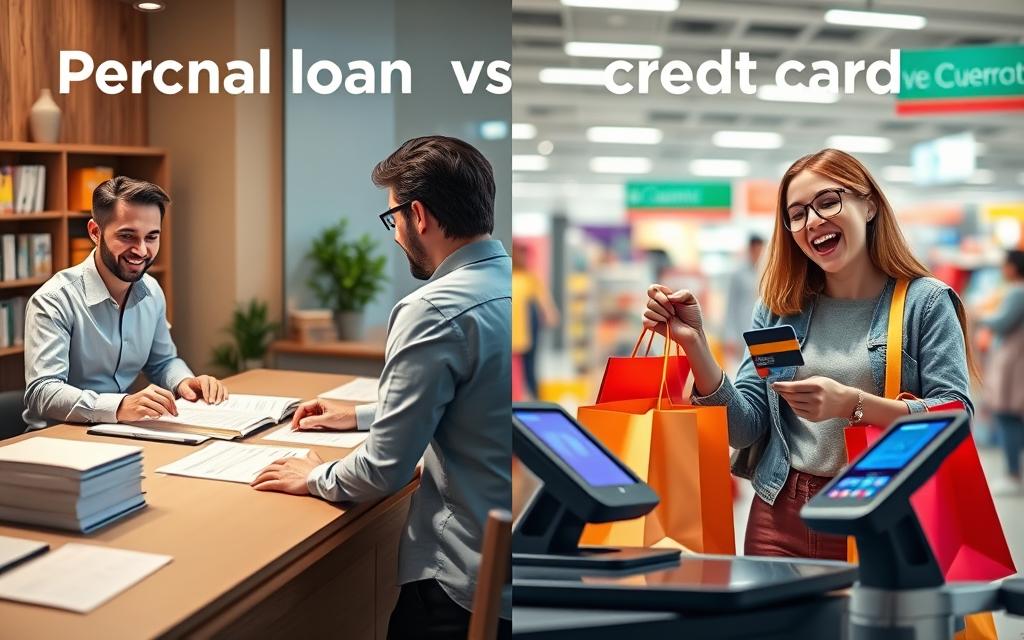If you have to borrow money, you might be wondering whether it is better to use a personal loan or a credit card. Each one has its advantages as well as disadvantages. Which is the best option will depend on the circumstances surrounding your financial needs and goals. There are major distinctions between personal loans and credit cards and we shall examine them to assist you to decide.
Personal loans and credit cards are different financial tools for personal needs. Knowing some of them such as revolving credit and fixed credit, interest rate, and repayment term should be essential to you. Also look for the costs of borrowing, the merits of personal loans for substantial purchases, and, the right circumstances in which a credit card would be more useful than a personal loan.
Knowing the Basic Differences Between Personal Loans and Credit Cards
When you need some funds, you will have to choose between credit cards and personal loans. Both can enable you to access funds but do so in different ways. One has to bear in mind the fundamental principles especially regarding the types of credits, interest rates and the repayment of the loan.
Fixed vs. Revolving Credit: A personal loan provides you with a loan amount that is predetermined, which you repay in installments over a certain period of time. In contrast, the use of a credit card allows one to borrow and repay money in parts instead of one. Every month, borrowers can decide how much money they want to use in repaying their debt.
Interest Rate Structures: They almost always have an interest rate that is fixed and, therefore, able to be predicted. This allows you to know just how much will have to be paid back. However, interest rates attached to credit cards can be altered. This creates difficulty in forecasting how much will be paid eventually.
Repayment Terms and Flexibility: In personal loans, the amount of repayment each month never changes. There is a specific time frame set for all the payments to be completed. On the other hand, credit cards give their users more options. They allow people to make minimal repayments or always maintain an outstanding balance. These distinctions are important in making your choice between personal loans and credit cards. Assess what it is you need and what your aims are. This will enable you to select the most suitable alternative for you.
How Interest Rates Impact Your Borrowing Costs
Interest is very crucial when borrowing money from either a personal loan lender or credit card issuer. Depending on the kind of interest, whether fixed or variable, it has a major influence on the amount that owing will end up being. This applies to both the original loan amount as well as the interest.
When it comes to personal loans, the majority of these loans have some fixed rate of interest charge that remains constant over the entire loan duration- which makes it able to plan monthly repayments easily. However, credit cards are usually variable-rated systems which have measures that adjust or fluctuate with the market to make it difficult to have an idea about the overall balances credit card will charge in the future.
Rate structure changes the total cost payable considerably. By way of example, fixed rate 10% on personal loan would mean repayment will always remain the same; however, credit cards rate varies from 15%-20% which are overrated when used frequently because budgeting turns out to be very complicated due to constant fluctuation on the interest charges every month.
When it comes to choosing between a credit card or a personal loan, it is imperative to take the understanding of interest rates into consideration. There will be long-term implications due to the rate of interest, thus providing direction in any decision making process. Moreover, this decision is necessary in order to align with other personal financial targets and offer cost benefits in the future.
The Benefits that Personal Loans Hold For These With Large Expenses: Personal loans can be beneficial when it comes to making large purchases. There are situations where they are more necessary compared to credit cards. One can use it for debt consolidation, home improvements, or any significant life events. It is a convenient way to manage your financial resources in a cost-effective manner.
Benefits of Debt Consolidation
Personal loans are frequently taken out for the purpose of debt consolidation. It allows one to combine multiple debts at a high interest into a single debt with a lower interest rate. It makes repayable much simple and can save on the interest cost significantly.
Home Renovation Financing: Home repairs and improvement can be funded by personal loans. Since these loans have fixed monthly payments, it will be easy to create a budget. This is very good for huge projects since credit cards may not provide enough or favorable terms.
Financing For Any Major Life Events: Let us also not mention that personal loans can be used for major activities in one’s life. This includes financing a wedding, paying a hospital bill, or covering tuition fees. Offers an easy and fixed repayment with a set interest rate Allows you to enjoy the occasion without having to worry about funds.
| Expense Type | Personal Loan Advantages |
|---|---|
| Debt Consolidation | Lower interest rates, simplified repayment, potential for significant savings |
| Home Improvement | Fixed interest rates, predictable monthly payments, larger borrowing power |
| Major Life Events | Financial stability, structured repayment plan, focus on the experience |
“Personal loans can be a game-changer for managing large expenses, offering a more cost-effective and flexible alternative to credit cards.”
If you have to borrow money, you might be wondering whether it is better to use a personal loan or a credit card. Each one has its advantages as well as disadvantages. Which is the best option will depend on the circumstances surrounding your financial needs and goals. There are major distinctions between personal loans and credit cards and we shall examine them to assist you to decide.
Personal loans and credit cards are different financial tools for personal needs. Knowing some of them such as revolving credit and fixed credit, interest rate, and repayment term should be essential to you. Also look for the costs of borrowing, the merits of personal loans for substantial purchases, and, the right circumstances in which a credit card would be more useful than a personal loan.
Knowing the Basic Differences Between Personal Loans and Credit Cards
When you need some funds, you will have to choose between credit cards and personal loans. Both can enable you to access funds but do so in different ways. One has to bear in mind the fundamental principles especially regarding the types of credits, interest rates and the repayment of the loan.
Fixed vs. Revolving Credit: A personal loan provides you with a loan amount that is predetermined, which you repay in installments over a certain period of time. In contrast, the use of a credit card allows one to borrow and repay money in parts instead of one. Every month, borrowers can decide how much money they want to use in repaying their debt.
Interest Rate Structures: They almost always have an interest rate that is fixed and, therefore, able to be predicted. This allows you to know just how much will have to be paid back. However, interest rates attached to credit cards can be altered. This creates difficulty in forecasting how much will be paid eventually.
Repayment Terms and Flexibility: In personal loans, the amount of repayment each month never changes. There is a specific time frame set for all the payments to be completed. On the other hand, credit cards give their users more options. They allow people to make minimal repayments or always maintain an outstanding balance. These distinctions are important in making your choice between personal loans and credit cards. Assess what it is you need and what your aims are. This will enable you to select the most suitable alternative for you.
How Interest Rates Impact Your Borrowing Costs
Interest is very crucial when borrowing money from either a personal loan lender or credit card issuer. Depending on the kind of interest, whether fixed or variable, it has a major influence on the amount that owing will end up being. This applies to both the original loan amount as well as the interest.
When it comes to personal loans, the majority of these loans have some fixed rate of interest charge that remains constant over the entire loan duration- which makes it able to plan monthly repayments easily. However, credit cards are usually variable-rated systems which have measures that adjust or fluctuate with the market to make it difficult to have an idea about the overall balances credit card will charge in the future.
Rate structure changes the total cost payable considerably. By way of example, fixed rate 10% on personal loan would mean repayment will always remain the same; however, credit cards rate varies from 15%-20% which are overrated when used frequently because budgeting turns out to be very complicated due to constant fluctuation on the interest charges every month.
When it comes to choosing between a credit card or a personal loan, it is imperative to take the understanding of interest rates into consideration. There will be long-term implications due to the rate of interest, thus providing direction in any decision making process. Moreover, this decision is necessary in order to align with other personal financial targets and offer cost benefits in the future.
The Benefits that Personal Loans Hold For Thse With Large Expenses: Personal loans can be beneficial when it comes to making large purchases. There are situations where they are more necessary compared to credit cards. One can use it for debt consolidation, home improvements, or any significant life events. It is a convenient way to manage your financial resources in a cost-effective manner.
Benefits of Debt Consolidation
Personal loans are frequently taken out for the purpose of debt consolidation. It allows one to combine multiple debts at a high interest into a single debt with a lower interest rate. It makes repayable much simple and can save on the interest cost significantly.
Home Renovation Financing: Home repairs and improvement can be funded by personal loans. Since these loans have fixed monthly payments, it will be easy to create a budget. This is very good for huge projects since credit cards may not provide enough or favorable terms.
Financing For Any Major Life Events: Let us also not mention that personal loans can be used for major activities in one’s life. This includes financing a wedding, paying a hospital bill, or covering tuition fees. Offers an easy and fixed repayment with a set interest rate Allows you to enjoy the occasion without having to worry about funds.
| Credit Score Requirement | Personal Loans | Credit Cards |
|---|---|---|
| Minimum Score | 580 – 680+ | 660 – 720+ |
| Impact on Future Credit | Hard inquiry, credit utilization, payment history | Hard inquiry, credit utilization, payment history |
| Building Credit History | Timely payments, low utilization, credit mix | Timely payments, low utilization, credit mix |
Knowing the credit score needs for loans and cards helps you choose wisely. Whether you pick a loan or card, focus on building a strong credit profile. This will benefit you in the long run.
Application Process and Approval Timeline Comparison: Getting financing can be different for personal loans and credit cards. Knowing how they work can help you decide better. It also sets the right expectations for your application journey.
The loan application process asks for a lot of personal and financial info. This includes income, job status, and credit history. You might need to provide documents like pay stubs or tax returns to prove you’re creditworthy. The time it takes to get a loan approved can be anywhere from a few days to weeks, depending on the lender and your financial situation.
Applying for a credit card is usually quicker. You just need to fill out a short form with basic info. The approval timeline for a credit card can be very fast. Many issuers make decisions instantly based on your credit score.
| Criteria | Personal Loan | Credit Card |
|---|---|---|
| Application Process | Detailed personal and financial information, supporting documentation | Shorter application form, basic personal and financial details |
| Approval Timeline | Few days to several weeks | Instant decision, as quick as a few minutes |
The application process and approval timeline are key when choosing between personal loans and credit cards. Understanding these differences helps you pick the right option for your needs and goals.

Fees, Charges, and Additional Costs in Borrowing: The Bottom Line
Borrowing personal loans and the more commonly used credit cards exist some additional fees and costs that most consumers ignore. These factors can affect the amount that you will be expected to pay back. Thus, making a hasty decision, in this borrowing area, could come back to hurt you.
Annual fees compared to origination fees: Today almost all credit cards have some form of annual fee which can range from something as little as twenty dollars to around eight hundred dollars. However, origination fees are charged in the beginning when the personal loan is taken out. It is captured depending on the client and should be factored into the loan in totality.
Delinquent payment penalties: These are late penalties that come from loans and credit cards if the payment is not made in due time. The limit of these fees is too high and once interest rates are definitely lost, it becomes a situation where loss after loss is recorded. It is therefore important that one considers the late payment criteria so that no unnecessary cost is incurred.
Questions for Balance Transfers: Although balance transfers provide the chance to obtain a loan with low interest it does attract certain charges. A number of cards restrict a part of the balance that could be transferred to a foreign account. Further, the promotional period of low interest rate is also time related, therefore improves with time. Always cross check if the proposed financing terms fit your finances before you sign off the deal.
Coping with such learning concerns, such balances assist in making necessary expectations ‘fit’ when selecting credit cards or loans to take. It’s always a matter of choosing the best option more suited for making a particular situation happen.
Secured vs. Unsecured Debt: Making the Decision
Secured and unsecured loans are the two commonly used types of loans borrowed. Understanding as to how either of the two works will assist you to determine the best approach to take in the decision making process. Everything depends on one’s financial ability as well as the degree of risk one would want to expose themselves to.
Secured loans require lashed in something such as a house or a car because these reduces the risk of the loan to the lender so better interest rates and better terms may be extended. Therefore ideal for major purchases or long term requirements such as mortgage or auto loans. These are very ideal for major purchases or long term requirements such as mortgage or auto loans. Unsecured loans do not require collateral. Rather the lender looks at the income and credit score of the borrower. Personal loans e.g. personal loans is characterized with high percentages for which credit cards are one of the commonest examples of these loans, however, if one has a history of poor credit, these tend to be less difficult to obtain.
| Loan Type | Collateral Required | Interest Rates | Approval Odds |
|---|---|---|---|
| Secured Loans | Yes | Lower | Higher |
| Unsecured Loans | No | Higher | Lower |
However, consider the advantages as well as drawbacks when taking a loan. For efficient resource management, secured loans may be a better option since the borrower has more flexibility. On the other hand, if you do not default on the loan, you lose your collateral. Unsecured loans are more accessible but more expensive in the long run. What type of loan is appropriate for you depends on your personal needs and financial possibilities. If you are aware about all the variants, you can make a decision which is appropriate in terms of risk and requirement for you.
Credit Cards Compensation Vs The Perspective Of Personal Loan
When it comes to borrowing money nowadays, the credit card and personal loan options are two of the more popular options available. The advantage you get with credit cards is you can use them to make purchases and then get some sort of reward too. On the other hand, personal loans are less complex with fixed repayment options. Seeking to understand the finer details is what helps avoid making a bad decision.
People often find credit card rewards too tempting. Examples include cashback and travel points, etc. Such rewards can help in reducing the overall interest payment. And yet for smaller payments you will normally find that personal loans cost you far less over time especially for larger loans.
| Feature | Credit Cards | Personal Loans |
|---|---|---|
| Interest Rates | Variable, typically higher | Fixed, typically lower |
| Rewards | Cashback, travel points, or other incentives | No rewards program |
| Repayment Terms | Flexible, revolving credit | Fixed, predictable schedule |
While comparing various financing tools ranging from credit cards to personal loans, always keep in mind your own financial aims. Evaluate considerations such as the interest rates, rewards programs and modes of repayment. All this will help you pick the best option depending on your situation.
“What’s important is the statement more comprehensively putting the two together: the ease and benefits of using credit cards, the high costs of personal loans.”
Concluding the Present discussions: Important Factors to keep in mind
There are a few important factors you need to skip when either getting a personal loan or getting a credit card. Consider your current financial situation, how good or how bad is your present credit rating and your future plans. This will help you decide which of these may work best for you.
How does one determine which the loan amount should be used for? To resolve other previous obligations, to refurbish an existing house or perhaps just to hold a function? I would consider the fact that if making a bigger more singular purchase then individual loans would be more advantageous. In contrast, credit cards would be ideal for smaller amounts which do not require a set amount.
Most importantly, also consider how it will affect your credit history and the overall process of application. Your financial background, together with your preference will determine the suitable option. Do not hurry, take your time studying all options with regard to price, specifications, and influence on timing. This will help you arrive at a conclusion that is most appropriate to your desired monetary plans and way of life.
FAQ
What are the key differences between personal loans and credit cards?
Personal loans and credit cards differ in their credit structures and interest rates. Personal loans have fixed rates and repayment plans. Credit cards, on the other hand, have revolving credit and variable rates.
How do interest rates impact the overall borrowing costs?
Interest rates are crucial in determining borrowing costs. Personal loans often have fixed rates, making budgeting easier. Credit cards have variable rates, which can lead to higher costs over time.
What are the advantages of using personal loans for large expenses?
Personal loans are great for big expenses like debt consolidation or home improvements. They offer lower rates and fixed payments, making budgeting simpler.
When do credit cards make more financial sense?
Credit cards are better for short-term needs or rewards programs. They’re flexible and convenient, especially for quick payoffs.
How do credit score requirements differ for loans and credit cards?
Both loans and credit cards need a minimum credit score. A good score can improve your borrowing terms. Using them responsibly can also boost your credit.
What are the key factors to consider when choosing between personal loans and credit cards?
Choosing between loans and credit cards depends on your financial needs and goals. Consider interest rates, repayment terms, fees, and your borrowing purpose. This will help you pick the best option for you.


